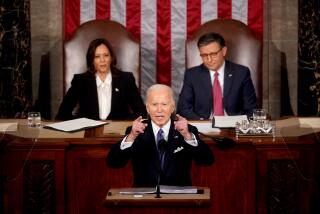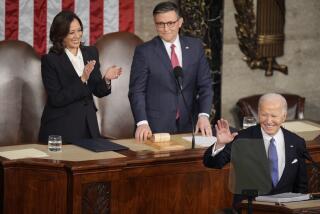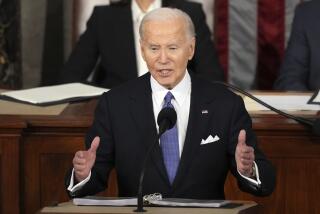War Now Drives the Presidency
- Share via
WASHINGTON -- Though crowded with proposals for domestic initiatives, President Bush’s State of the Union address Tuesday night underscored how thoroughly his presidency is being driven by the fierce engine of war.
Bush’s first State of the Union address, in January 2002, was dominated by the Sept. 11 terrorist attacks just four months before and his determination to extend the war against terror to what he dramatically termed the “axis of evil” -- Iraq, Iran and North Korea.
His speech Tuesday night was dominated by the prospect of military action against Iraq -- if not imminently, then before very long.
“We will consult, but let there be no misunderstanding,” Bush said. “If Saddam Hussein does not fully disarm, for the safety of our people and for the peace of the world, we will lead a coalition to disarm him.”
By offering an ambitious domestic agenda, Bush demonstrated again his desire to avoid the perception that undermined the presidency of his father, George H. W. Bush, after the 1991 Persian Gulf War: the belief that he is so focused on threats abroad that he is oblivious to problems at home.
But by so vividly reaffirming his commitment to confronting the Iraqi president, Bush also displayed a determination to force a reckoning with Baghdad that is likely -- for good or for ill -- to overshadow all of his domestic efforts for months, if not throughout his term.
Even the other members of the putative axis -- Iran and North Korea -- received little more than glancing discussion in Bush’s brisk, sometimes somber remarks.
In some ways, the speech had a quality of deja vu. Almost all of its themes -- from tax cuts, Medicare reform and energy independence at home to the warnings to Hussein -- echoed priorities and promises from last year’s State of the Union address.
Bush made a passionate pitch Tuesday night for his $670-billion tax cut, and urged Congress to move on a fundamental restructuring of Medicare.
He renewed his call for Congress to advance the energy plan that stalled in the Senate last year. And he unveiled a major humanitarian effort, calling for $15 billion to fight AIDS in Africa and the Caribbean.
All but the last of these ideas promise intense conflict with Democrats, who wasted no time in condemning Bush’s domestic agenda as either irrelevant or counterproductive.
They argued that the gaping federal budget deficits that have opened under Bush, and the tax cuts he is proposing, will leave him without the resources to fulfill the promises he put forth Tuesday.
“The state of the Union is not as good as it should be, [and] I didn’t hear tonight any realistic plans for making it better,” said former Vermont Gov. Howard Dean, a candidate for the Democratic presidential nomination in 2004.
As he begins these fights, Bush still enjoys substantial political support. But his position has eroded since his last State of the Union speech.
Though Bush’s energetic campaigning helped the GOP widen its lead in the House and seize control of the Senate in last fall’s election, the president’s approval rating has fallen from 80% or higher in January 2002 to 60% or lower in a flurry of polls released over the last 10 days.
On Capitol Hill, the tax cut at the centerpiece of Bush’s domestic agenda has received a cool reception, even from some Republicans, amid projections of massive federal budget deficits for years.
“The wind appears to be in his face, rather than at his back, on a host of issues,” conservative activist Gary Bauer wrote in a memo released just before the speech.
In polls, Bush now receives much higher marks for his handling of national security and terrorism than he does on domestic issues, such as the economy and health care. But that wind has been blowing against him even on Iraq.
Over the last several weeks, polls have shown growing domestic unease about an invasion of Iraq, particularly if the United Nations does not endorse the move. Protests against a possible war have become more visible.
Yet White House officials have been confident that, beginning with Tuesday’s speech, they can tilt opinion back in their direction, and even some Democratic analysts agree.
The White House optimism rests on three pillars.
One is Bush’s demonstrated ability to shift opinion, as he did last September when he made his initial appeals to the U.N. for renewed action against Iraq. Second, both the White House and Democrats believe Bush will benefit from the traditional inclination of the American public to defer to the president on foreign affairs and to rally around the commander in chief, at least initially, when he commits forces to battle. Finally, they believe that Hussein will continue to provide evidence that he is unwilling to disarm.
In that sense, the appearance Monday of chief weapons inspector Hans Blix before the U.N. may have been more of a turning point than Bush’s address. In his unexpectedly tough indictment of the Iraqi regime, Blix reframed the case against Iraq into a succinct argument: While Iraq was cooperating with the “process” of inspections, it was continuing to resist the “substance” of disarmament.
Bush followed a similar strategy, underscoring the gap between the chemical and biological weapons Iraq had previously acknowledged possessing and those it can prove it has destroyed.
Even before Bush’s speech, there was evidence this argument may be subtly strengthening the administration’s position in the domestic debate. Though opposition to a near-term invasion of Iraq has been broadening among Democratic officials, Blix’s conclusions may be sapping some of its intensity.
Just hours before Bush’s address, for instance, Sen. John F. Kerry (D-Mass.) told a small group of reporters that based on Blix’s report, he believed Iraq was now clearly in material breach of the U.N. resolutions demanding disarmament.
Last week, Kerry had accused Bush of a “rush to war” and urged him to give inspections more time and to work harder to build international support for any military action. But on Tuesday, while repeating those arguments, Kerry also said he would be open to a U.N. resolution authorizing an invasion if Iraq did not disarm within 30 days. “That would sound pretty reasonable,” he said.
One other telling sign: The Democratic response, from Washington Gov. Gary Locke, offered no hint of dissent on Iraq and instead emphasized the domestic disputes with Bush.
Bush may be facing a rockier road with public opinion abroad, especially in Europe.
In preparing the speech, White House officials said they knew foreign observers might be watching the address more closely than usual. But they insisted that they showed little inclination to reshape the tone or the substance on Bush’s message on Iraq to appeal to that audience.
In one sense, Bush may have made a concession to foreign sensibilities: He did not reprise the description from last year’s address of North Korea, Iran and Iraq as the “axis of evil.” That phrase provoked intense resistance from many foreign leaders.
But he did reaffirm the substantive argument behind the “axis of evil” rhetoric: his contention that “the gravest danger facing America and the world” is a potential alliance between terrorists and “outlaw regimes that seek and possess nuclear, chemical and biological weapons.” And he continued to insist that he will act alone whenever he considers it “necessary ... [to] defend the freedom and security of the American people.”
Bush made another gesture toward skeptics at home and abroad. He said Secretary of State Colin L. Powell will travel to New York next week to provide the U.N. with additional “information and intelligence about Iraq’s illegal weapons programs.” And his aides made clear that, in the days ahead, Bush will offer “a series of speeches” to reinforce the case he laid out again Tuesday night.
But, for all of those procedural concessions, nothing in Bush’s remarks dented the sense that he believes war, with or without allied support, is the only way to eliminate the threat that he sees in Hussein.
By 2004, Bush’s handling of the standoff with Iraq is likely to be only one piece of the judgment the voters make on him. His record on the economy and on other domestic problems, such as the rising number of Americans without health insurance or the increase in poverty, will also affect his reelection prospects.
Bush touched on many of those concerns and found time, too, for issues with great resonance for narrower audiences. He moved to reinforce his conservative base by recommitting himself to a ban on human cloning, even for research purposes, and late-term “partial birth” abortions, and reached out to centrists by promising more money for social programs, such as drug treatment and recruiting mentors for children whose parents are incarcerated.
Yet, as he has on many occasions since the Sept. 11 attacks, Bush made clear again that he sees the struggle against terrorism -- now concentrated into the confrontation with Iraq -- as the core of his mission as president. Typically suspicious of grand rhetoric, Bush rose to a rare height of eloquence in insisting that he, and the nation, would persevere in that test. “Whatever the duration of this struggle, and whatever the difficulties, we will not permit the triumph of violence in the affairs of men,” he declared. “Free people will set the course of history.”
More to Read
Get the L.A. Times Politics newsletter
Deeply reported insights into legislation, politics and policy from Sacramento, Washington and beyond. In your inbox twice per week.
You may occasionally receive promotional content from the Los Angeles Times.










